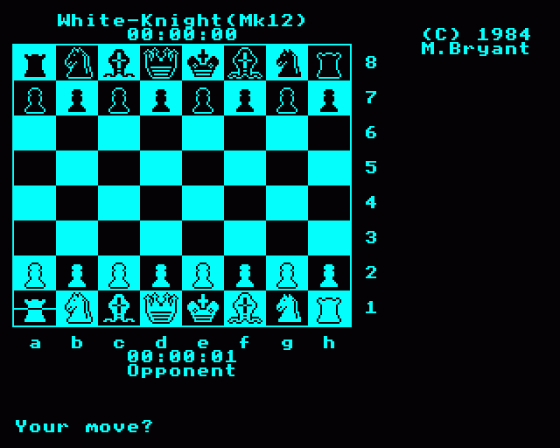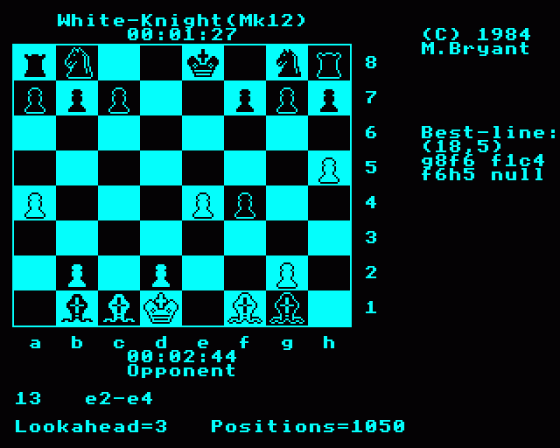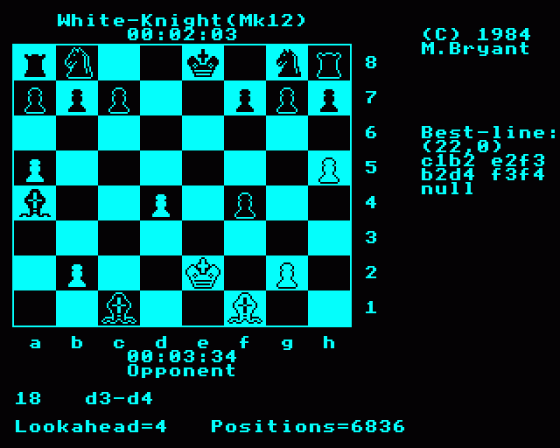
The Micro User
 1st March 1986
1st March 1986
Author: Alex Bell
Publisher: BBCSoft/BBC Publications
Machine: BBC Model B
Published in The Micro User 4.01
White Knight canters home a clear winner
I first tested BBC Soft's White Knight some two years ago (see The Micro User December 1983). It was then obviously the best available chess program on the BBC Micro, but it had a couple of shortcomings.
The first was that, although it could solve most two mate problems in about two seconds on average - which is very fast - it did not appreciate underpromotion.
The second quibble was that there was no facility to SAVE and RESTORE a game.

The latest White Knight version, Mk 12, is now available on disc and is claimed to be four times as powerful as its predecessor, Mk 11.
Author Michael Bryant has "incorporated additional features, such as saving the state of the game, suggested by reviewers" and now also claims "it has a perfect understanding of all the rules of chess, including stalemate, underpromotion, the 50 move rule and all draws by repetition" and "its estimated rating is 1850+ELO".
Now these are ambitious claims because I have never seen any program with "perfect understanding of ... all draws by repetition" because, thanks to en passant and castling possibilities, the position may look the same but the available moves differ.

However such subtleties do not matter in a real game, but claiming 1850+ does matter and is remarkable since this is about the level of a county player in England and 100 points better than any chess program some 10 years ago.
To test this I gave it the K,R v K ending, which Mk 11 could not do. Mk 12 did it easily in about one minute total play time.
Next the K,B,B v K ending - the program can do this but needs, and had to be told, to take about 10 minutes. It can't do the K,B,N v K ending, but neither can some county players even if they know that they have to drive the Black King into a corner of the Bishop's colour.

The SAVEEDRA position. Figure 1 is a good test of anyone or anything's appreciation of repetition of position plus stalemate and underpromotion.
White King played this puzzle flawlessly: P-B7 then, because of continuous checks by the Rook plus the need to avoid repetition, it played its King down the board to C2 (which at last prevents the threat of a Rook skewer in Cl).
I therefore played the Rook back to its starting position in D4, which threatens stalemate if the pawn is queened. White Knight correctly underpromoted to a Rook and quickly won the game - it was all very fast and very impressive. I also tried the old Blackburne opening trap, based on the Giouco Piano:

White Knight Black 1. P-K4 P-K4 2. N-KB3 N-QB3 3. B-B4 N-Q5?
which offers a pawn. All chess programs not protected by a book fall for this trap thus:
4. N*P Q-N4! 5. B*P+ K-K2
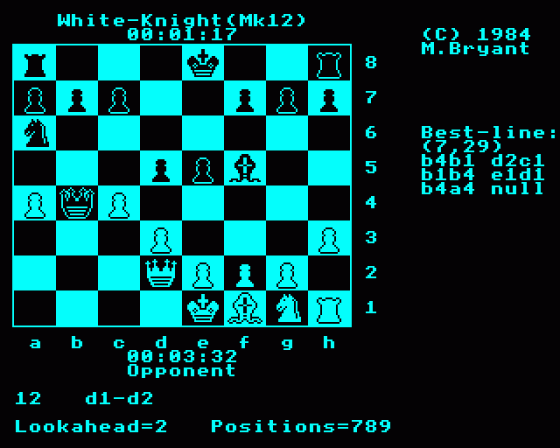
but very few appreciate the dangers and recover correctly at this point by giving up the Knight for a King side castling - White Knight does.
The mate solving mode is, if anything, faster than ever and the program comes with a booklet describing literally dozens of other options.
They include stepping forward and backwards through 120 moves, clock and speed of play settings, displaying "Best line" (or not if this is distracting) plus improvements like it "thinks" in your time hence often anticipating your move and replying instantly and so on.
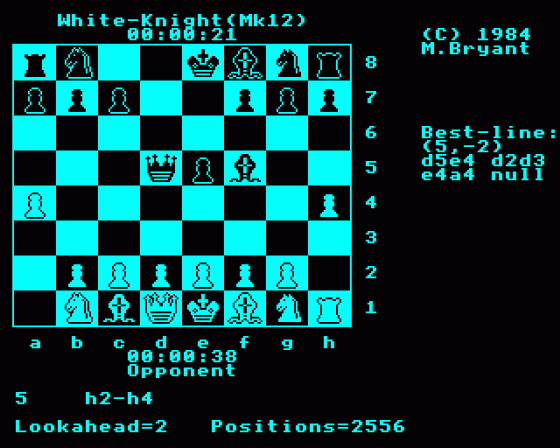
This time it has every option I can think of, and more.
The booklet states that "White Knight is by far the best computer chess program available on the (BBC) computer".
Having tested it - it passed every one - and played it - it's certainly above 1750 - I can only say that this claim is too modest.
White Knight is probably the best chess program on any micro. Highly recommended.



